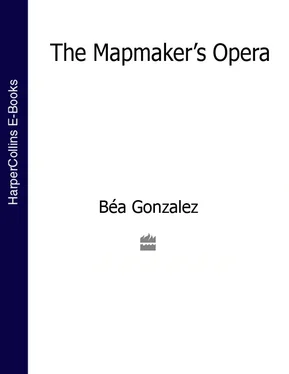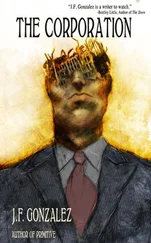“My father—may he rest in peace, he has been dead so long now—had the means to pay workers to do the harvesting for him but that did not save us from lending a hand, and we cooked all day to keep the workers well fed and content. Oh, but those were wonderful days! It is easy to forget the work and to remember only the colours—the mauve not-quite-purple of the flowers, the deep yellow-red of the stems; and the taste too of the newly produced saffron which brought to life one of Aunt Bautista’s splendid stews. I can smell them, hijo, ” she would say then, and saying it would bring her red, hardened fingers up to her nose in an effort to recapture the moment, as if the taste of those stews rested still on her tongue.
There would be a point to Mónica’s stories, though it would take her some time to make it as she meandered around a hundred digressions and as many laments, but Diego would come to learn that Mónica’s memories exacted their own price, for none was offered without the expectation of receiving something in return. And the price, in this case, would be akin to blood—though not what courses through our veins, but the metaphorical stuff that links one generation to another, the one that links father to son.
“Because there is a reason to recall all of these memories, my son,” she told him, just when he was beginning to despair that the secret she hinted at would never be revealed. And the point to all of these bucolic harvest-memories and her happy time as governess in one of the grandest houses in Seville was this: “I miss the spice that once grew freely at my back door; the spice only the rich can afford while the rest of us wade in rose water dreaming of the taste. The azafrán that is not only spice but medicine, one that has saved many a good woman from suffering the pain of miscarriages and stillbirths and babies dead too soon to be properly mourned.
“Because there is no greater tragedy than this, Diego—listen well and never forget it, my son: To have savoured something so potent only to see yourself deprived of it for the rest of your life.”
And before he had time to digest the meaning of it, before he had time to understand the direction, the tenor of the tale, Mónica quickly sat him down and without emotion or remorse, told the young man every detail of his parentage, leaving out nothing—providing no proper preamble, for how can you jump from saffron to a secret of such magnitude?
The woman was a bruta, no doubt about it; we will soon see just how much of a bruta she really was.
Diego did not react to the news in the way she expected. He did not ask for more information than he had already received—did not want to hear about the colour of his father’s eyes, his manner of walking or his many peculiar likes and dislikes. Thinking about it later, Mónica realized that she was relieved, that she could not remember the colour of Don Ricardo’s eyes, his manner of walking or any of his peculiar likes or dislikes. That when she remembered him she thought only of the silk of his waistcoat, the green velvet of his breeches with the filigree buttons, the deep blue suit he often boasted of, made by Utrilla himself in Madrid—“the greatest tailor who has ever lived.”
As soon as he could, Diego left the house to recreate all the walks taken with Emilio, because it was clear to him that Emilio was the only father he would ever admit despite his mother’s stories—stories that convinced him only that there was something amiss with her head, that perhaps Uncle Alfonso was right, she was indeed a loca and what a martyr his father had been to have put up with this. What a saint, he said out loud, suppressing the onslaught of tears.
He walked to the cathedral first, entered it as his father had done, with respect and awe, not for God, Emilio had once told him secretly, but for the wondrous artisans who had fashioned this monument from stone. From there, he made his way across to the Patio de los Naranjos, a peek at the Giralda, and then run, run, run to the banks of the Guadalquivir, where the Torre del Oro stood, a resplendent monument of gold.
All the while, inside his head, he could hear Emilio’s voice chatting to the English.
It was Seville that first heard of the New World, that witnessed the arrival of Columbus himself on Palm Sunday in 1493. He had returned from his voyage of discovery in triumph and with a few other things besides. A suite of plants, exotic birds and the few Indians whose likes had never been seen in Europe and whose sad faces stunned those ladies who peeked at them from behind their tortoiseshell fans.
In Seville, Diego Velázquez was born—perhaps the best painter Spain gave to the world. Here, too, the first words of our national masterpiece, Don Quijote, were written by the great Cervantes, while a prisoner in the Carce Real.
Eventually Diego stopped in front of the Archives of the Indies, his favourite spot in all Seville.
Hijo, he heard Emilio call out to him, will you never tire of the reams of paper, the exuberant scrawls of a bunch of explorers eager to tell of their exploits, more invented than real?
Diego was not hungry for the reams of paper but for the memory of a map.
El Señor Raleigh had taken him there once. “To look upon one of the best maps of all time,” he had said to him in his tentative Spanish, with its soft r ’s and lightness of tone. Juan de la Cosa’s Mappa Mundi —“astounding,” el Señor Raleigh had declared, in English this time. And after the Mappa Mundi, the maps of the Relaciones Geográficas commissioned by Philip II—“a madman” to the English, “a man made of more complex stuff than could ever be unearthed” to the Spanish—a king, nevertheless, who had dreamed of revealing the invisible to the naked eye.
Diego stood outside for almost an hour, accompanied by his memories—the maps, Emilio’s tours of the city, el Señor Raleigh’s musings on life and Philip II. Had the king been a simple madman or had he been indeed a man of more complexity than history could ever hope to discern? He stood there, as if transported, but really just a confused bony child aching for certainty, aching to have his father back—Emilio and his stories of love, Emilio and his jumbled, not-quite-right English rhymes.
He went home then. Mónica was waiting for him, and remorse now tumbled from her lips—“I should not have told you about him. I should have taken the secret with me to the grave.” All night she apologized like this, chastising herself, cursing at their bad luck in losing Emilio so early, could fate have been crueller to them? Her words of regret and reproach were uttered quietly. There was no need for Uncle Alfonso to know any of this. “No, no, hijo, ” she cautioned him, fear in her voice. “Uncle Alfonso would waste no time throwing us out onto the street.”
In the morning—after a night of tossing and turning for Diego, a surprisingly solid rest for his mother—the point of her stories came to land, finally, at his feet.
“Not now, ahora no, not yet,” Mónica told him, as she fed him his favourite breakfast of hot chocolate and sweet bread made by the Carmelite nuns, “but soon, very soon, Diego, you will go to the house of Don Ricardo Medina and demand to be received in the manner that you deserve.”
Конец ознакомительного фрагмента.
Текст предоставлен ООО «ЛитРес».
Прочитайте эту книгу целиком, купив полную легальную версию на ЛитРес.
Читать дальше












